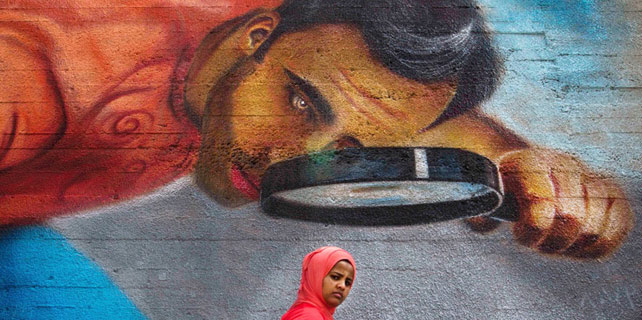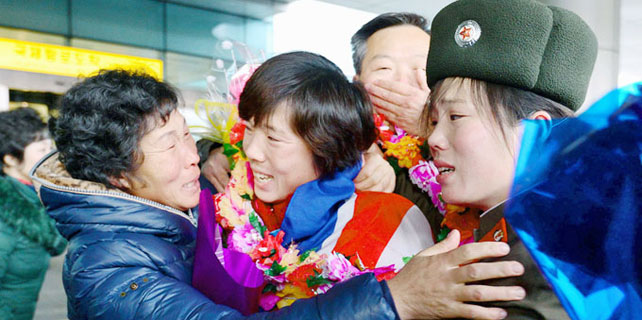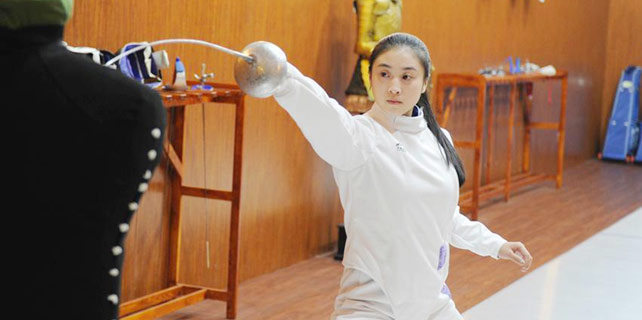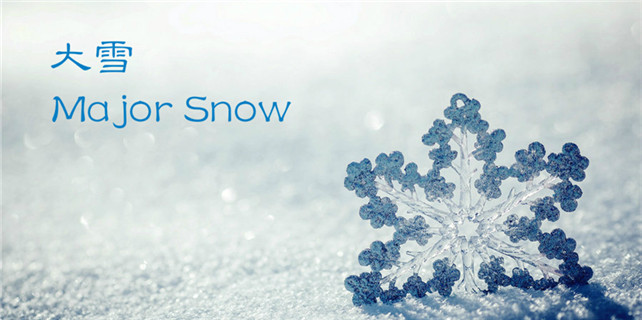Building character
Some Chinese symbols take on whole new meanings when they're multiplied
It's hard to learn Chinese, especially the characters. Sometimes it seems just like random strokes are jumbled together and given an arbitrary meaning. But in some special cases, you will find the construction of some particular characters follows a simple law - a character plus itself equals a new character.
Let's take the basic character 人 (rén, person, people) as an example. When one person meets another one, it becomes 从 (cóng), meaning follow, join, secondary or to act in a certain manner or according to a certain principle. The basic meaning is "follow", which is quite easy to understand when you see one person just appear along with another. If there comes a third person, it will then become 众 (zhòng), meaning many, numerous, or a large number of people. The logic is just as you may guess: Two may be company, but three is a crowd.

人都有从众倾向。
Rén dōu yǒu cóngzhòng qīngxiàng.
People have a tendency to follow the crowd.
The character 口 (kǒu, mouth, hole or entrance) is another example. When two 口 come together, it is 吕 (lǚ), which is mostly used as a surname. Though it has another meaning, "temperament", we can hardly say it has any connection with 口. Three 口 can also work. It is 品 (pǐn), which has a lot of meanings. As a noun, it could be an article, product, rank, character or quality. While as a verb, it means taste, which may be related to its radical 口 in a way.
So here is a sentence:
小吕正在小口地品茶。
Lyu is sipping tea and tasting its flavor.
Xiǎo Lǚ zhèngzài xiǎokǒu de pǐnchá.
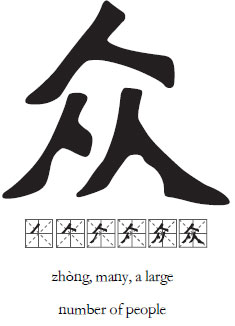
Maybe you can also think of the character 田 (tián), which looks like four 口. But actually it has nothing to do with 口, it a pictographic character, meaning field.
This law of building a character can only be applied to a few characters, including the Five Elements - metal (金, jīn), wood (木, mù), water
(水, shuǐ), fire (火, huǒ) and earth (土, tǔ), which is a fivefold conceptual scheme that many traditional Chinese fields used to explain a wide array of phenomena, from cosmic cycles to the interaction between internal organs, and from the succession of political regimes to the properties of medicinal drugs. Let's have a look at them one by one.
金 - 鑫
金 (jīn) is the simplest one, because there is only the three-金 character, 鑫 (xīn), which means financial prosperity. Usually, you can't find a word containing this character, but it is commonly used in personal or shop names. Since 金 has the meaning of "gold" and "cash", for people who want money, 鑫 is of course bliss, even compared with a single 金.
木 - 林 - 森
This is the one that makes the most sense. One 木 (mù) is a "tree". 木 is the radical of many Chinese characters, many of which are names of a certain plant. When five木 come together, it becomes the two-character word 森林 (sēnlín, forest). Individually, 林 (lín) means wood, grove, or cluster of similar things. And 森 (sēn) means "trees growing thickly", or "gloomy and horrendous".
水 - 沝 - 淼
水 (shuǐ) is water, a common word. But two 水 make 沝, which has two pronunciations, zhuǐ and zǐ, meaning that sand at the beach that is under the ocean. This character is uncommon and almost never used in daily life. 淼 (miǎo) means "an expanse of water", and it is often used in people's names. And when you come to ?, you have every right
to doubt whether it is a character, as most Chinese do (it's pretty rare). It is pronounced as màn, and means flood, given that so much water is gathered together.
火 - 炎 - 焱 - 燚
火 (huǒ) is fire; a pictographic character, 炎 (yán) is scorching, or extremely hot; 焱 (yàn) is blaze, flame. The special one is 燚 (yì), which means burning fiercely, an uncommon character again.
土 - 圭 - 垚
土 (tǔ) is soil, earth, dust; 圭 (guī) is a tapering handheld jade tablet used by nobility on ceremonial occasions in ancient times. And if someone can pronounce 垚 (yáo) correctly, chances are they know a person who uses it as name. It's rare, but for those who are interested, it means high mountains.
Many of these characters are rarely used, except in names. To understand why, we need to go back to the Five Elements concept. It's mentioned that ancient Chinese tended to use the Five Elements to explain everything, including people's fate. And even today, when a baby is born, many parents will ask a fortune-teller to analyze their shengchen bazi (生辰八字), which translates to "the date of birth and the eight characters of the horoscope", before naming the baby. After a mysterious calculation process, the fortune-teller will conclude that the baby lacks a certain element in life, which would of course affect their luck in the future, and the solution is to give them a name containing that element. So, you can tell that a man named 垚 is very likely to have been diagnosed as lacking earth in his life, and a girl whose name is 淼 may be short of water.
And if you search online, you will find some more interesting characters. For example, three horses (马, mǎ) make 骉 (biāo), describing many horses galloping together; 犇 (bēn), made up of three cows (牛, niú), means "run fast" or "super strong".
Let's finish with a funny piece of internet slang -又双叒叕. While this is often seen online, very few native speakers can actually say it.
The first character, 又 (yòu), means "again". The second, 双 (shuāng), means "pair" or "double". These two are very common characters in Chinese. But the last two are not ordinary Chinese. 叒 is the ancient version of "友 (yǒu, friends)"; 叒, pronounced as "ruò", refers to deep friendship; 叕 has four types of pronunciation: zhuó, yǐ, lì, jué, and you really don't need to learn its meanings, since it's almost never used. When these four characters appear together in order, it means "again and again and again and again and again …" When think about the meaning of 又, you can easily figure out why.
You can use it when you want to express a strong emotion, as in:
天啊,这个孩子又双叒叕哭了!
The baby is crying agaaaaaaiiiiiiin!
Courtesy of The World of Chinese, www.theworldofchinese.com
The World of Chinese
(China Daily European Weekly 12/09/2016 page23)



